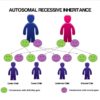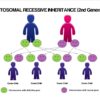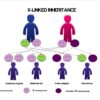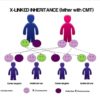Inheritance patterns
Humans have about 22,000 genes. These are grouped together on 23 paired chromosomes: 23 single chromosomes from your mother and 23 from your father. And, apart from the sex cells – sperm and unfertilised eggs – every single human cell has a full copy of these 46 chromosomes in 23 pairs.
In contrast, the sperm and egg cells each only have a single set of chromosomes. When a sperm cell fertilises an egg, the two sets combine, forming a new cell, with the double set. This cell then multiplies, creating a new individual with 10,000 trillion cells, each one containing a copy of the original 23 pairs of chromosomes.
In this way genes, including faulty ones (mutations), are passed on down through the generations. Not all faulty genes will have an effect. It all depends on the inheritance patterns of that single gene.
Also in this section

Inheritance patterns
Dominant (autosomal dominant)
Some faulty genes are dominant, which means that you only need one faulty gene to have CMT. In effect, the dominant gene over-rules the instructions from the ‘good’ gene.
The most common forms of CMT in the UK are dominant, including most forms of CMT1 and CMT2.
If you have a dominant form of CMT, you have a 50:50 chance of passing on the faulty gene to any children. If they inherit it, they will usually develop the symptoms of CMT.
Dominant inheritance (AD) (Most types of CMT1 and CMT2)
- One parent with CMT = one in two chance child will have CMT whether male or female
With each pregnancy, this couple has a 50:50 chance of having a child with CMT, whatever the child’s sex.
Dominant [Affected + Unaffected]
Autosomal Recessive (Some types of CMT1 and CMT2)
If a faulty gene is recessive it means that you need two copies of the same faulty gene (one from each parent) before you could develop CMT.
If you have only one faulty recessive gene you are known as a carrier. You will not develop CMT, but you have a 50:50 chance of passing on your faulty gene to your children. If they inherit it, they will only get CMT if they inherit a second faulty gene from the other parent.
Some forms of both CMT1 and CMT2 are recessive.
If your CMT is caused by two faulty recessive genes, you will definitely pass on one of your faulty genes to your children. But unless they inherit the same faulty gene from the other parent, they will only be a carrier.
If both parents are carriers for the same recessive gene (i.e. they each only have one copy), their children have a one in four chance of developing CMT (by inheriting two copies of the gene) and a 50 per cent chance of being carriers (by inheriting one copy of the gene).


X-linked (sex-linked)
Of your 23 pairs of chromosomes, the 23rd pair is known as the pair of sex chromosomes, X and Y. If you inherit two X chromosomes you become a woman and if you inherit an X and a Y you become a man.
Four faulty genes responsible for CMT have been discovered on the X chromosome. Men who get X-linked CMT are often more severely affected than women.
X-linked inheritance (CMTX)
- Mother has faulty gene and father unaffected = 50:50 chance that children will have CMT (males more severely than females, who are either usually mildly affected or unaffected)
- Father has CMT and mother unaffected = all daughters will inherit the faulty gene (and are usually either mildly affected or unaffected), but sons will be neither affected nor carriers


‘De novo’ mutation
Genes can change (mutate) ‘out of the blue’. If this happens, future generations will be exposed to the risk of inheriting the changed gene in just the same way as described above.
About one in 20 people with CMT1A have a new genetic mutation, but these are much more commonly seen with other types of CMT, for example CMT2A.
Sporadic CMT
The term sporadic is used when someone with CMT apparently has no family history (i.e. no other family members are affected). There are a number of possible reasons for this:
- There are no other family members available to be examined to see if they may be affected or the family is very small, making it less likely that someone else has CMT.
- There has been a ‘de novo’ mutation as explained above.
- In the case of somebody with an autosomal recessive form of CMT, they may be the only child with CMT and their parents will both be disease-free as they are carriers.
Summary of inheritance
You can inherit CMT in one of the following ways:
- if one parent has a dominant form of CMT
- if both parents are either carriers of, or affected by a recessive form of CMT
- if your mother has X-linked CMT
- if you are female and your father has X-linked CMT
- by a new mutation of the gene. (‘de novo’ mutation)
Contact Charcot-Marie-Tooth UK today
Can’t find what you’re looking for? Get in touch


